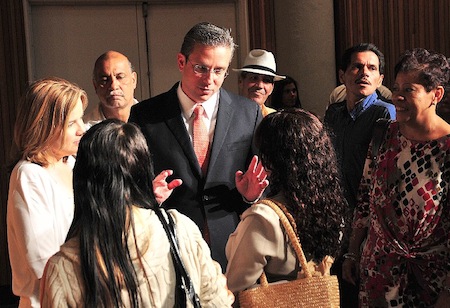Although voters in the United States chose to retain a Republican House of Representatives, a Democratic Senate and a Democratic president in Barack Obama, it wasn’t as good a night for incumbents in the Commonwealth of Puerto Rico.![]()
![]()
Alejandro García Padilla (pictured above), a Puerto Rican senator, narrowly defeated Puerto Rico’s governor Luis Fortuño in Tuesday’s Puerto Rican gubernatorial election and Fortuño conceded the race earlier this afternoon — with over 96% of the votes counted, García Padilla leads with 47.85% to just 47.04% for Fortuño.
The result will cap what was generally a good night for García Padilla’s Partido Popular Democrático de Puerto Rico (the PPD, Popular Democratic Party of Puerto Rico), which also took back control of Puerto Rico’s Asamblea Legislativa (Legislative Assembly) from Fortuño’s Partido Nuevo Progresista de Puerto Rico (the PNP, New Progressive Party of Puerto Rico), and which also won the mayoral race in San Juan, Puerto Rico’s capital and largest city.
So who is García Padilla? And how will García Padilla will his administration differ from Fortuño’s?
García Padilla, age 41, an attorney and former law professor, was elected to Puerto Rico’s Senate in 2008 as the PPD’s most popular vote-winner. He previously served as the secretary of consumer affairs under former PPD governor Aníbal Acevedo Vilá from 2005 to 2008.
García Padilla’s victory first and foremost likely means an end to the austerity policies of his predecessor.
As governor, Fortuño has essentially eliminated Puerto Rico’s $2 billion budget deficit, but he’s done so by cutting public sector jobs and reducing spending on higher education, even while he reduced taxes 50% for individuals and 30% for business. The implementation of his economic program has drawn considerable attention in the United States, and Fortuño himself is somewhat of a star within the Republican Party — he and his wife had primetime speaking roles during the Republican National Convention in August. If Mitt Romney had won Tuesday’s U.S. presidential election, it seemed likely that Fortuño could even be elevated to a cabinet position in a Romney administration.
Fortuño, already on the ropes after losing two referenda earlier in the summer to reduce the number of legislators in Puerto Rico’s legislative assembly and to give judges the right to deny bail in certain murder cases (Puerto Rico, uniquely, entitles everyone to bail regardless of the crime), was never quite a favorite for reelection.
García Padilla ran a stinging campaign against the harshness of Fortuño’s austerity measures in the face of an economic climate even more troubling than on the U.S. mainland — the economy has been in recession for six years, unemployment remains relatively high at 13.6% and the poverty level has reached a staggering 45.6%. Meanwhile, crime is rising steadily, with over 1,000 murders in 2011 alone. Puerto Rico’s GDP per capita of just around $24,000, about half that of the United States, makes it already much less prosperous than the mainland.
That’s in spite of the fact that the wider Caribbean economy is otherwise growing. Puerto Rico is one of the largest islands in the Caribbean — if independent, it would be the fourth-largest country in the region after Cuba, Haiti and the Dominican Republic. Moreover, its $96.3 billion economy is larger than either Cuba’s ($60.8 billion) or the Dominican Republic’s ($55.6 billion).
Despite Fortuño’s ties to the Republican Party, the PNP in the past has allied with both the Republican and Democratic parties on the mainland; the PPD, however, has always typically supported the Democratic party and García Padilla campaigned in Florida on behalf of Obama’s presidential campaign. As such, the gubernatorial election took on a more ideological contrast than normal, with García Padilla accusing Fortuño of running an ideological experiment with Puerto Rico’s finances.
Politics on the island typically have less to do with traditional U.S. ideological divides than with the Puerto Rico’s status vis-a-vis the United States. Puerto Rico is essentially a U.S. territory, known as a ‘commonwealth’ since 1952, and Puerto Ricans are U.S. citizens. Fortuño’s PNP supports statehood, while García Padilla’s PPD essentially favors the status quo as a commonwealth. The much smaller, pro-independence Partido Independentista Puertorriqueño (PIP, Puerto Rico Independence Party) has not historically attracted much support.
As such, despite a qualified victory for statehood in Tuesday’s referendum, García Padilla’s victory further complicates an already cloudy path for Puerto Rico’s eventual statehood hopes. García Padilla has in the past called for a constitutional assembly to address Puerto Rico’s status, and it seems unlikely that García Padilla will spend much time taking up the PNP’s pet cause when voters will be looking to him to create jobs and reduce crime.
It seems much likelier that García Padilla will turn to reversing some of the harshest budget cuts by raising spending on education and public safety, given the PPD’s newly-won control of the legislative assembly. The PPD will now control both Puerto Rico’s Cámara de Representantes (House of Representatives), where it will hold 28 seats to just 23 seats for the PPD, and Puerto Rico’s Senado (Senate) with 18 seats to just eight seats for the PPD and one seat for the PIP.
Aside from the gubernatorial and legislative elections and the referendum, the PNP major of San Juan, Jorge Santini, was defeated after 12 years in office by the PPD’s Carmen Yulín Cruz, a member of Puerto Rico’s House of Representatives since 2009.
In the gubernatorial election, the PIP’s Juan Dalmau Ramírez won just 2.53%.
Fortuño came to office after winning a landslide victory in the 2008 election — he defeated Acevedo Vilá, by around 53% to 41% amid a corruption scandal — Acevedo Vilá was tried on federal charges relating to illegal campaign contributions after leaving office. Although he was found not guilty, the allegations severely hurt Acevedo Vilá and the PPD in the 2008 election.

Puerto Rico is better off as sovereign free association meaning a fully independent nation but in association with United States.The current flag of Puerto Rico always been beautiful for that country.